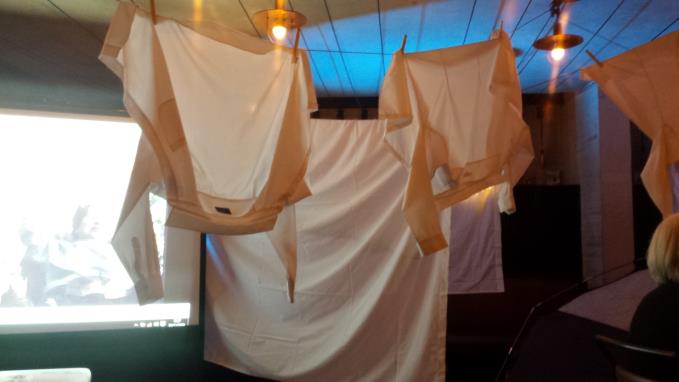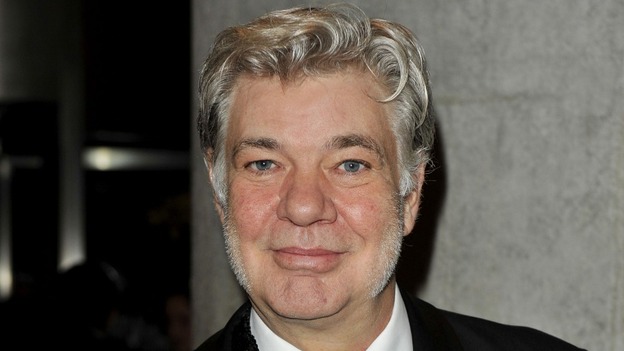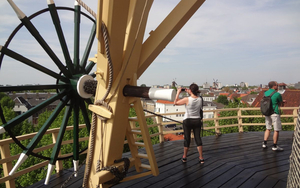SOMETHING odd is happening at the Everyman.
We have been given a clothes peg and told to hold onto it tightly. We have been ushered into the bistro where laundry hangs from the ceiling and a tent is set up in one corner. And now a polar bear with a boyish grin and a plastic cup of red wine is hoisting his hairy thumb aloft and declaring himself to be “excited” about what lies ahead.
I’m dressed as a polar bear though actually there are no polar bears in the South Pole. But this is a play about imagination
This is the launch of the theatre’s new season – the announcement of the shows that will hog the Hope Street stage during the first half of 2017.
But we have been to season launches before, and they’re not usually like this. This time, the warm wine and PowerPoint slides have been replaced by a series of theatrical high-jinx, of which this beaming polar bear, in his bistro lair, is one. There’s a distinct party mood in the building and an unavoidable sense that as of now, the Everyman really is going to do things differently.
The theatre’s Big Idea for 2017 is the return of the Everyman repertory company. By welcoming in a (still unidentified) group of 14 multi-skilled performers to work on five home-grown shows during the first half the year, the theatre hopes to tap into the spirit of great Everyman companies gone by while also reinventing the form for the future.
“This really is a new beginning,” says Deborah Aydon, executive director of the Everyman and Playhouse. “For six months of every year, a company of resident actors will work with our resident directors to create an entire season of work. Some will be from Liverpool, but all those actors will live and breathe this city throughout the season.”
 The Antarctic Tundra, as represented by some washing
The Antarctic Tundra, as represented by some washingRepertory theatre, or "rep", as those in the know would have it, was once the way that most British theatre was made. Permanent companies in cosy playhouses became the stars of the local stage before going on, if they were lucky, to populate the sitcoms and plays for today that made telly in the 1970s so memorable.
The Everyman rep company really cracked it. All that working, drinking and playing together forged emotional bonds between the performers and the city that can still be felt today. The BBC’s recent Artsnight with Julie Walters and Willy Russell is testament to that.
These days though, rep is a rare beast. The received wisdom is that actors no longer want to commit to such extended contracts, and that the demands of TV and film make it impossible to work that way. The result is that our great regional theatres seem to circulate a series of co-productions that lack any sense of local identity. They may make good theatre, they may make bad, but when it’s all so similar, it’s hard for audiences to ever think of these shows as their own.
It’s hardly surprising then that the Everyman’s move has caused a stir. Its rep experiment is being watched closely and, judging by the actorly clamour for a place, that received wisdom might be well wide of the mark.
For Lucy Dossor, whose dad, Alan, recently died after a career that included running the Everyman during the 1970s, this is a time to keep eyes fixed on the future, rather than hankering after a golden age.
“If you’d have asked Dad he would have resisted giving advice, I think – unless pressed or pissed,” she says. “He might have said ‘What the fuck does anyone know? Except for those people, in that company, in this place, now.’ But he would certainly have wished them the best.”
The identity of the 2017 Everyman rep company remains under wraps for now as casting is not quite complete. The shows, however, are out of the bag, which brings us back to our slowly simmering polar bear.
Buried beneath the off-white fun fur sits Nick Bagnall, the theatre’s associate director. He is introducing one of the five productions that form the new season, Manfred Karge’s 1986 play The Conquest of the South Pole.
“I’m dressed as a polar bear though actually there are no polar bears in the South Pole,” he says, “but this is a play about imagination. It’s one of the most beautiful plays I’ve ever read and it couldn’t be more fitting for next year as it’s a totally company play.”
Karge’s exploration of stifled dreams and political frustrations is about a group of unemployed people ground down by daily life. They read a book about Amundsen’s expedition to the South Pole, then decide to recreate the journey in their attic. Originally written for the Berliner Ensemble three years before the fall of the Berlin Wall, Bagnall’s version will be set in Liverpool, and he clearly sees it as a play that connects with this city.
 Alan Dossor led the Everyman rep company into its golden era
Alan Dossor led the Everyman rep company into its golden era“It speaks directly to the heart of Liverpool,” he says, “a city which refuses to give in and which is not prepared to back down. It’s a play about a gang of people holding hands, telling stories and using their imagination. And that seems to be the perfect fit for what we’re asking the company to do next year.”
Private struggles, communal solidarity and the power of storytelling all seem like themes that tie this season together. Once the panto is over, the first rep company show will be Fiddler on the Roof directed by the Everyman’s artistic director, Gemma Bodinetz. That’s followed by Bagnall’s The Conquest of the South Pole, a new version of Brian Patten’s The Story Giant adapted by Lindsay Rodden, a new play by Lizzie Nunnery, set around Lodge Lane called The Sum, and then Romeo and Juliet directed by Bagnall.
All the shows will then play in repertory until early July, which will give performers, producers and audiences alike an what is designed to be an opportunity to reconsider works from earlier in the season, make new connections, and get to know each other in ways that haven’t been possible since the demise of the old rep system.
Back in the Everyman's bistro, Nick Bagnall’s polar bear is climbing aboard what seems to be his hobby horse.
“There’s a generic type of actor that comes through now,” he says, “because in 1991 the
y stopped their grants, and actors from all backgrounds couldn’t train. It annoys me. So I think having a rep company allows young actors to develop.
“I know stories from people in rep who’ve been in the bar one night, and someone’s come up to them and gone ‘You were shit in this show, but you were great in that other show’. And I think having that relationship with the actors is all important.”
So if nothing else, the return of the rep company gives us all more chance to tell actors what we think of them, but it feels as though there’s a much bigger adventure in store.
Just one question though, Everyman. Why are we still holding a clothes peg?

Meanwhile, over at the Playhouse, Matthew Kelly and Paul McGann
 Matthew Kelly
Matthew Kelly“THE Playhouse is entering a new phase of its own in 2017,” says Ben Lloyd, the theatre’s producer.
“We’re moving towards working with visiting companies and artists in a different way, a more embedded way. The kind of companies we’re looking to bring are those that have a connection with us. We want companies to work with our youth theatre, with local artists, and to see Liverpool as a place they’re creating work for and collaborating with.”
In practice, this means a season that includes the return of Matthew Kelly in Pride and Prejudice, Headlong’s production of Pygmalion, Northern Broadsides with a new adaptation of Cyrano de Bergerac, Paul McGann in Moira Buffini’s Gabriel, and an intriguing programme of early works by choreographer Matthew Bourne.
There’s also the Edinburgh Fringe smash Glasgow Girls, Roald Dahl’s The Twits, and the National Theatre’s verbatim piece about Brexit, My Country: a work in progress.













